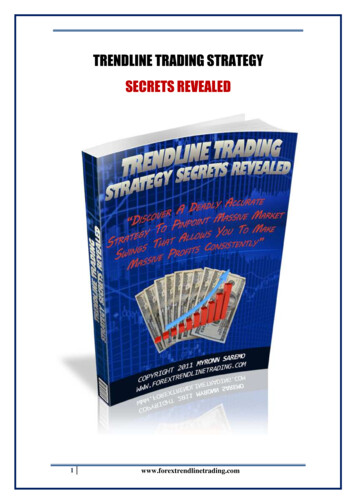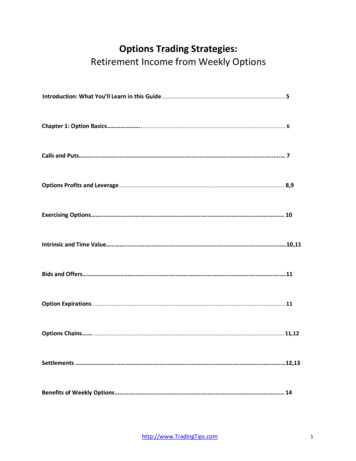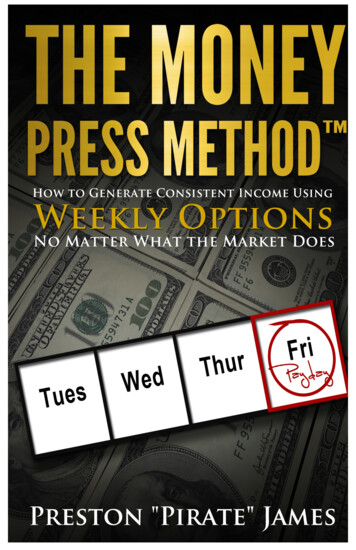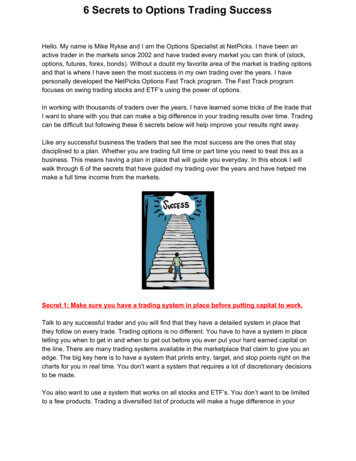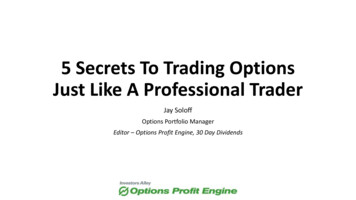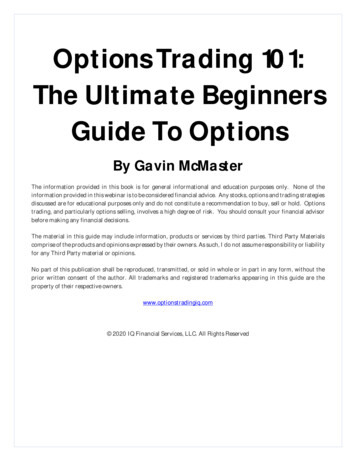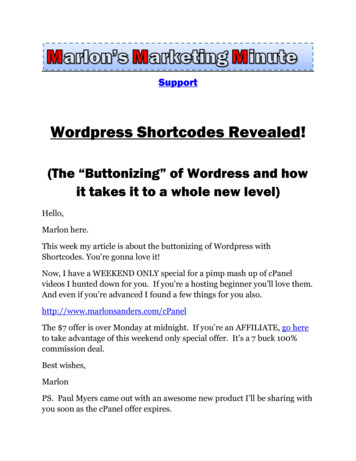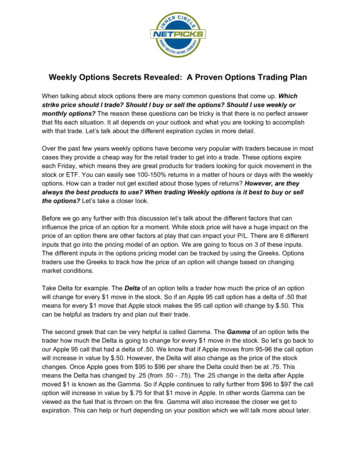
Transcription
Weekly Options Secrets Revealed: A Proven Options Trading PlanWhen talking about stock options there are many common questions that come up. Whichstrike price should I trade? Should I buy or sell the options? Should I use weekly ormonthly options? The reason these questions can be tricky is that there is no perfect answerthat fits each situation. It all depends on your outlook and what you are looking to accomplishwith that trade. Let’s talk about the different expiration cycles in more detail.Over the past few years weekly options have become very popular with traders because in mostcases they provide a cheap way for the retail trader to get into a trade. These options expireeach Friday, which means they are great products for traders looking for quick movement in thestock or ETF. You can easily see 100-150% returns in a matter of hours or days with the weeklyoptions. How can a trader not get excited about those types of returns? However, are theyalways the best products to use? When trading Weekly options is it best to buy or sellthe options? Let’s take a closer look.Before we go any further with this discussion let’s talk about the different factors that caninfluence the price of an option for a moment. While stock price will have a huge impact on theprice of an option there are other factors at play that can impact your P/L. There are 6 differentinputs that go into the pricing model of an option. We are going to focus on 3 of these inputs.The different inputs in the options pricing model can be tracked by using the Greeks. Optionstraders use the Greeks to track how the price of an option will change based on changingmarket conditions.Take Delta for example. The Delta of an option tells a trader how much the price of an optionwill change for every 1 move in the stock. So if an Apple 95 call option has a delta of .50 thatmeans for every 1 move that Apple stock makes the 95 call option will change by .50. Thiscan be helpful as traders try and plan out their trade.The second greek that can be very helpful is called Gamma. The Gamma of an option tells thetrader how much the Delta is going to change for every 1 move in the stock. So let’s go back toour Apple 95 call that had a delta of .50. We know that if Apple moves from 95-96 the call optionwill increase in value by .50. However, the Delta will also change as the price of the stockchanges. Once Apple goes from 95 to 96 per share the Delta could then be at .75. Thismeans the Delta has changed by .25 (from .50 - .75). The .25 change in the delta after Applemoved 1 is known as the Gamma. So if Apple continues to rally further from 96 to 97 the calloption will increase in value by .75 for that 1 move in Apple. In other words Gamma can beviewed as the fuel that is thrown on the fire. Gamma will also increase the closer we get toexpiration. This can help or hurt depending on your position which we will talk more about later.
The third greek that is important to understand is Theta . The Theta of an option tells the traderhow much time impacts the value of the option. In other words, it tells us how much time decaythere is for each day we hold the position. The key to Theta is knowing it will increase the closeryou get to expiration. This can hurt an option’s value if you have bought an option. On the flipside, if you have sold an option to open a position the time decay will help you.Going back to our earlier question on whether we should buy or sell the weekly options, it alldepends on market conditions. If we are expecting a quick move within the next few days, thenthe weekly options will give us the most bang for our buck. This is due to the fact that Gamma ishigher the closer we get to expiration (see chart below). As a result of the higher gamma in theweekly options, the prices of those options will react quicker to movement in the stock. We willsee more powerful moves as long as the move happens quick enough. Remember options aredecaying assets, which means the longer we hold them the more time value comes out. As longas the move happens quick enough, then we can overcome the time decay.
Buying Weekly Options - Strategy CriteriaMany newer traders get intrigued by weekly options because in many cases they are verycheap which is great for small account sizes. However, you don’t want to back yourself into acorner by only buying weekly options. They are cheap for a reason. When buying a weeklyoption we only have one way of making money. They don’t have much time left beforeexpiration, which means the move in the stock has to happen quickly in order to make money.When buying weekly options you need everything to line up in your favor perfectly. When thishappens the returns can be extremely large. The trade off here is that you will have a lowerwinning percentage when buying the weekly options. You will be banking on the fact that yourwinners will be large enough to offset the losing trades.What can we do to increase our odds of success when buying weekly options?I only like to buy weekly options in periods of high volatility. The market has to be showingconsistent quick swings back and forth. We can’t afford to hold long weekly options for verylong so we need to make sure the market will allow us to get in and out in 1-3 days at themost.You will also want to make sure you are trading stocks and ETF’s that have liquid options. Whilethere are many products that offer weekly options that doesn’t mean they are all equal. Youwant to focus in on stocks and ETF’s that have good volume and open interest spread acrossnumerous different strike prices. A good rule of thumb for me is to look for open interest onthe option that I am trading of 25x the number of contracts I am looking to trade. So if Iwant to trade 1 contract then I want to see at least 25 contracts of open interest.
When choosing which option to buy I like to get 1-2 strikes in the money from the entrypoint on the chart. So if I’m looking to buy a weekly call option on FB with the stock price at 162.87, then I would look to buy the 160 call option. I leave myself a little wiggle room here bysaying 1 or 2 strikes in the money to make sure I am trading an option with good volume andopen interest.Once you are in a position, make sure you are willing to book profits quickly. Remember timedecay and gamma increase the closer you get to expiration. If you hold too long any little move
in the stock can lead to instant losses. When buying weekly options I like to make sure I amin and out within 1-3 days. If the move in the stock doesn’t happen inside of this window thenit really is best to either close out of the position all together or roll the position farther out in timeto give yourself more time to be right.Selling Weekly Options - Strategy CriteriaWe mentioned earlier that we like to take what the market is giving us when deciding whichoptions strategy is best to trade. This will have us buying weekly options at times but there arealso many times when selling the weekly options will increase our performance. Since timedecay picks up the closer we get to expiration, there are strategies that will allow us to makemore money from that time decay.One of my favorite options strategies to use is selling vertical spreads with Weekly options.While I am willing to buy individual calls and puts, I don’t like to sell the naked options as thatcomes with undefined risk which doesn’t fit my risk tolerance. Selling vertical spreads is oneof the simplest but powerful options strategies that you can use.When selling vertical spreads, I will sell a call spread when I’m bearish and sell a put spreadwhen I’m bullish. Why would I use these instead of buying calls and puts? Earlier, wementioned when buying a call or a put option you only have one way of making money. Thestock has to move in your favor and it has to do so quickly. The problem here is in many casesthe stock doesn’t move quick enough and you are left with a position that is losing money everyday that you hold it.When selling a vertical spread to open a position we are actually getting paid to hold the tradeeach day. We can structure these trades in a way that we will have 5 different ways ofmaking money. We can make money from a stock move higher, lower, or sideways and alsofrom time decay adding up and volatility decreasing. In doing so we don’t need everything to line
up perfectly in our favor. We have multiple ways of making money which in turn will give us ahigher winning percentage.So with 5 different ways of making money when selling spreads why wouldn’t use thesetrades all the time?The trade off to having so many ways of making money is that we will have a bad risk to rewardscenario. Following our trade criteria, we are looking for trades that will give us a risk 2 or 3 tomake 1 scenario. While this doesn’t look attractive at first glance, we are willing to accept theseratios because of the 5 different ways we have of making money.Before we get into the criteria that we look for when structuring these trades let me point out thatwhen selling spreads we will be in positions that have defined risk. I talk to many newer traderson a regular basis that get intimidated by selling options due to thinking they have large risk.When selling a spread we are always buying an out of the money option as part of the spread todefine our risk. This way we know our worst case scenario right up front which also makes iteasier for us to manage our risk.When selling vertical spreads, I like to use a few rules to make sure we are in trades that willboth give use the best performance long term while also controlling our risk. To start, we needto decide if we are bullish or bearish on the stock or ETF that we are looking to trade. If bearishyou will look to sell a call spread. If bullish you will look to sell a put spread.Short Call Spread - Bearish TradeLet’s take a look at a short call spread first. We will always sell a call spread when we want to bein a bearish position. In most cases, I will sell spreads on weekly options that havebetween 7 and 20 days left to expiration. In doing so I take advantage of the increased timedecay that occurs the closer we get to expiration. With time decay working in our favor we canafford to hold th
saying 1 or 2 strikes in the money to make sure I am trading an option with good volume and open interest. Once you are in a position, make sure you are willing to book profits quickly.

